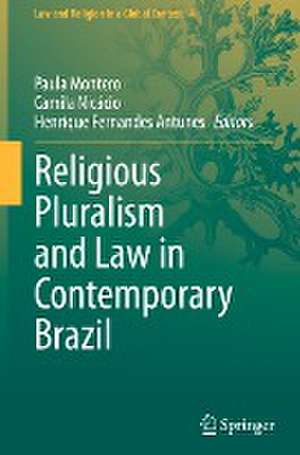Religious Pluralism and Law in Contemporary Brazil: Law and Religion in a Global Context, cartea 4
Editat de Paula Montero, Camila Nicácio, Henrique Fernandes Antunesen Limba Engleză Hardback – 29 dec 2023
Preț: 893.53 lei
Preț vechi: 1089.67 lei
-18% Nou
Puncte Express: 1340
Preț estimativ în valută:
170.100€ • 185.68$ • 143.64£
170.100€ • 185.68$ • 143.64£
Carte tipărită la comandă
Livrare economică 22 aprilie-06 mai
Preluare comenzi: 021 569.72.76
Specificații
ISBN-13: 9783031419805
ISBN-10: 3031419804
Ilustrații: IX, 231 p.
Dimensiuni: 155 x 235 mm
Greutate: 0.52 kg
Ediția:1st ed. 2023
Editura: Springer International Publishing
Colecția Springer
Seria Law and Religion in a Global Context
Locul publicării:Cham, Switzerland
ISBN-10: 3031419804
Ilustrații: IX, 231 p.
Dimensiuni: 155 x 235 mm
Greutate: 0.52 kg
Ediția:1st ed. 2023
Editura: Springer International Publishing
Colecția Springer
Seria Law and Religion in a Global Context
Locul publicării:Cham, Switzerland
Cuprins
Introduction: Religious Pluralism and Law in Contemporary Brazil.- Part I Pluralism: minority rights, religious freedom and secularism.- Religion and Laicity in Dispute: Two Categories Under Construction in Brazil’s legal Debate on Religious Education in Public Schools.- Evangelical jurists and human rights in Brazil: a case study of the National Association of Evangelical Jurists (ANAJURE).- Formalizing religious intolerance in police records: a picture of a (de)construction problem.- Evangelicals Against the Criminalization of Homophobia: The “Christian Majority" and the Dispute Over Public Morality.- “It is not solved just by writing it down on paper”: patrimonialization policies and the religious use of ayahuasca as a Brazilian intangible cultural heritage.- Part II Human Rights as Language.- Controversies in Brazil’s Supreme Court over when human life begins.- Quilombola communities and the right to land ownership: notes on a legal controversy in the Supreme Federal Court.- Humanrights and their policy-visibility in producing a public Islam in Brazil.- Human rights and works of the imagination: an ethnography of the first ordained transgender reverend in Latin America.
Notă biografică
Prof. Paula Montero is an Anthropology Professor at the State University of São Paulo (USP – Brazil) and a Senior Researcher at the Brazilian Center of Analysis and Planning (Cebrap). Ph.D. in Political Science at the University of São Paulo, Brazil, she was Visiting Scholar at the Institute of Latin American and Iberian Studies at Columbia University in 1984 and Tinker Visiting Professor at the University of Chicago in 1996. She participates as a principal investigator of the Nonreligion in a Complex Future project (University of Ottawa). Her research interests are focused on the interface between religion, law, and pluralism.
Prof. Camila Nicácio is a Law School Professor at the Federal University of Minas Gerais (UFMG – Brazil). Ph.D. in Law at the Université Paris I, Panthéon Sorbonne, France. She is Visiting Professor at Université de Laval, University of Ottawa, and Université Paris I, and participates as a collaborator of the Nonreligion in a Complex Future project (University of Ottawa). Her research interests are focused on the interface between law/religion, legal pluralism, human rights, and conflict mediation.
Dr. Henrique Antunes is a postdoctoral fellow at the Brazilian Center of Analysis and Planning. He has a Ph.D. in anthropology from the University of São Paulo. He is a member of the Center for Interdisciplinary Studies on Psychoactive Substances (NEIP) and the coordinator of the Ayahuasca Community Committee of the Chacruna Institute for Psychedelic Plant Medicines. He is also a member of the Nonreligion in a Complex Future project. His research interests are focused on religion, law, and drug policies.
Textul de pe ultima copertă
This book represents a unique contribution to understanding the interactions between law and religion in contemporary Brazil. It analyzes how the regulation of religions according to the classical notion of secularism has become a source of tensions since the 1990s. Against this background, the respective chapters demonstrate, on the basis of various case studies, how the constitutional principle of pluralism, introduced by the 1988 federal constitution after a military dictatorship, has been addressed by new political actors, such as religious leaders, parliamentarians, influencers, state representatives, and activists. In particular, the chapters demonstrate how the mobilization of legal language, notably the language of human rights, has become fundamental to developing and consolidating new political agendas concerning secularism, tolerance, freedom of expression, gender and sexuality, family, and cultural heritage. In the authors’ approach, human rights assume a central role in social disputes as a language in which actors constitute themselves as rights subjects, form activist networks, and pursue their goals by expressing themselves in public. Given its focus and scope, the book will be of interest to all scholars seeking to understand the relationships between diversity and the regulation of religious practices in plural societies, where the classical notion of secularism continues to show its limitations.
Caracteristici
Focuses on the mobilization of legal discourse in the public disputes that confront different worldviews Combines empirical approaches and complex analytical frameworks Provides for English readers a current landscape of the interface between law and religion in Brazil



